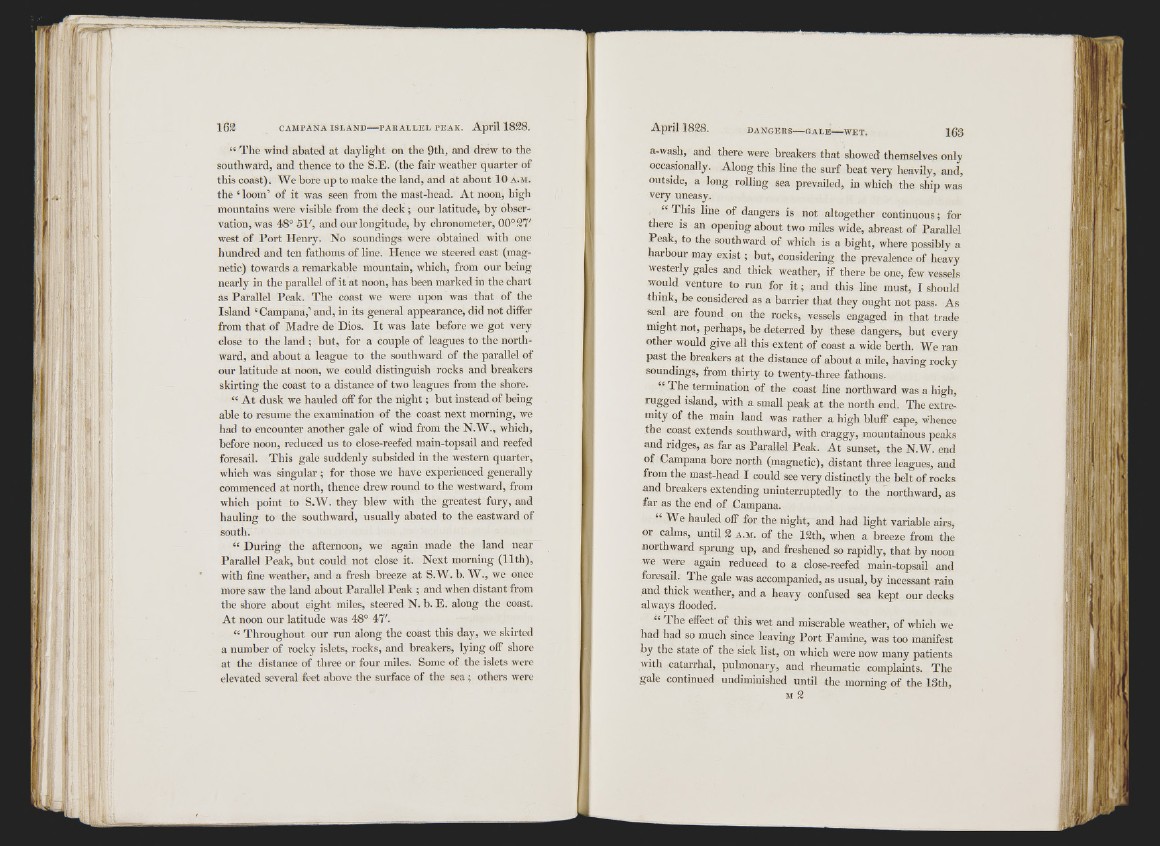
II! i i: I
' i. I
4
“ The wind abated at daylight on the 9th, and drew to the
southward, and thence to the S.E. (the fair weather quarter of
this coast). We bore up to make the land, and at about 10 a .m .
the ‘ loom’ of it was seen from the mast-head. At noon, higli
mountains were visible from the deck ; our latitude, by observation,
was 48° 51', and our longitude, by chronometer, 00°27'
west of Port Henry. No soundings were obtained with one
Imndred and ten fathoms of line. Hence we steered east (magnetic)
towards a remarkable mountain, which, from our being
nearly in the parallel of it at noon, has been marked in the chart
as Parallel Peak. The coast we were upon was that of the
Island ‘Campana,’ and, in its general appearance, did not differ
from that of Madre de Dios. It was late before we got very
close to the land ; but, for a couple of leagues to the northward,
and about a league to the southward of the parallel of
our latitude at noon, we could distinguish rocks and breakers
skirting the coast to a distance of two leagues from the shore.
“ At dusk we hauled off for the night; but instead of being-
able to resume the examination of the coast next morning, we
had to encounter another gale of wind from the N.W., which,
before noon, reduced us to close-reefed main-topsail and reefed
foresail. This gale suddenly subsided in the western quarter,
which was singular ; for those we have experienced generally
commenced at north, thence drew round to the westward, from
which point to S.W. they blew with the greatest fury, and
hauling to the southward, usually abated to the eastward of
south.
“ During the afternoon, we again made the land near
Parallel Peak, but could not close it. Next morning (11th),
with line weather, and a fresh breeze at S.W. h. W., we once
more saw the land about Parallel Peak ; and when distant from
the shore about eight miles, steered N. b. E. along the coast.
At noon our latitude was 48° 47'.
“ Throughout our run along the coast this day, we skirted
a number of rocky islets, rocks, and breakers, lying off shore
at the distance of three or four miles. Some of the islets were
elevated several feet above the surface of the sea ; others were
a-»ash, and there were breakers that showed themselves only
occasionally. Along this line the surf beat very heavily, and,
outside, a long rolling sea prevailed, in which the ship was
very uneasy.
“ This line of dangers is not altogether continuous ; for
there is an opening about two miles wide, abreast of Parallel
Peak, to the southward of which is a bight, where possibly a
harbour may exist ; but, considering the prevalence of heavy
westerly gales and thick weather, if there be one, few vessels
would venture to run for it ; and this line must, I should
thmk, be considered as a barrier that they ought not pass. As
seal are found on the rocks, vessels engaged in that trade
might not, perhaps, be deterred by these dangers, but every
other would give aU this extent of coast a wide berth. We ran
past the breakers at the distance of about a mile, having rocky
soundings, from thirty to twenty-three fathoms.
“ The termination of the coast line northward was a high,
lugged island, with a small peak at the north end. The extremity
of the main land was rather a high bluff cape, whence
the coast extends southward, with craggy, mountainous peaks
and ridges, as far as Parallel Peak. At sunset, the N.W. end
o f Campana bore north (magnetic), distant three leagues, and
from the mast-head I could see very distinctly the belt of rocks
and breakers extending uninterruptedly to the northward, as
far as the end of Campana.
“ We hauled off for the night, and had light variable airs,
or calm.s, until 2 a .m . of the 12th, when a breeze from the
northward sprung up, and freshened so rapidly, that by noon
we were again reduced to a close-reefed main-topsail and
foresail. The gale was accompanied, as usual, by incessant rain
and thick weather, and a heavy confused sea kept our decks
always flooded.
“ The effect of this wet and miserable weather, of which we
had had so much since leaving Port Famine, was too manifest
by the state of the sick list, on which were now many patients
with catarrhal, pulmonary, and rheumatic complaints. The
gale continued undiminished until the morning of the 13th,
M 2
Î •-,1
I. i'll